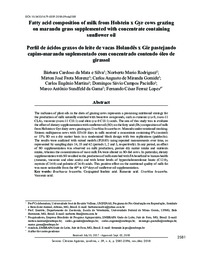Fatty acid composition of milk from Holstein x Gyr cows grazing on marandu grass supplemented with concentrate containing sunflower oil.
Fatty acid composition of milk from Holstein x Gyr cows grazing on marandu grass supplemented with concentrate containing sunflower oil.
Autoria: SILVA, B. C. da M. e; RODRIGUEZ, N. M.; MORENZ, M. J. F.; GOMIDE, C. A. de M.; MARTINS, C. E.; PACIULLO, D. S. C.; GAMA, M. A. S. da; LOPES, F. C. F.
Resumo: Abstract The inclusion of plant oils in the diets of grazing cows represents a promising nutritional strategy for the production of milk naturally enriched with bioactive compounds, such as rumenic (cis-9, trans-11 CLA), vaccenic (trans-11 C18:1) and oleic (cis-9 C18:1) acids. The aim of this study was to evaluate the effect of dietary supplementation with sunflower oil (SO) on the fatty acid (FA) composition of milk from Holstein x Gyr dairy cows grazing on Urochloa brizantha cv. Marandu under rotational stocking. Sixteen multiparous cows with 185±10 days in milk received a concentrate containing 0% (control) or 15% SO on a dry matter basis in a randomized block design with two replications (paddocks). The results were analyzed with mixed models (P ? 0.05) using repeated measurements over time, as represented by sampling days 14, 35 and 62 (periods 1, 2 and 3, respectively). In any period, an effect of SO supplementation was observed on milk production, pasture dry matter intake and nutrients intake, whereas the concentrations of most milk FA were altered in SO-fed cows. In particular, dietary supplementation with SO resulted in the production of milk enriched with FA beneficial to human health (rumenic, vaccenic and oleic acids) and with lower levels of hypercholesterolemic lauric (C12:0), myristic (C14:0) and palmitic (C16:0) acids. This positive effect on the nutritional quality of milk fat was more noticeable from the 40th to 43rd days of sunflower oil supplementation.
Ano de publicação: 2018
Tipo de publicação: Artigo de periódico
Unidade: Embrapa Gado de Leite
Palavras-chave: Brachiaria Brizantha, Conjugated linoleic acid, Rumenic acid, Urochloa brizantha, Vaccenic acid
Observações
1 - Por padrão são exibidas publicações dos últimos 20 anos. Para encontrar publicações mais antigas, configure o filtro ano de publicação, colocando o ano a partir do qual você deseja encontrar publicações. O filtro está na coluna da esquerda na busca acima.
2 - Para ler algumas publicações da Embrapa (apenas as que estão em formato ePub), é necessário ter, no celular ou computador, um desses softwares gratuitos. Sistemas Android: Google Play Livros; IOS: iBooks; Windows e Linux: software Calibre.
Acesse outras publicações
Acesse a Base de Dados da Pesquisa Agropecuária (BDPA) para consultar o acervo completo das bibliotecas da Embrapa.

